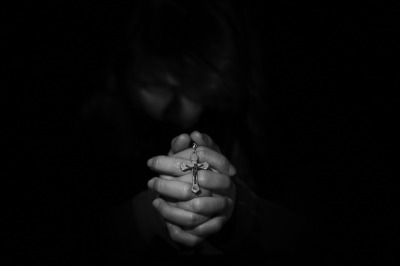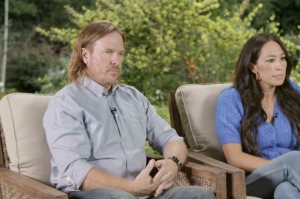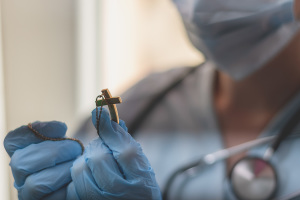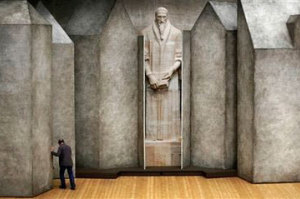A lesson from our black brothers and sisters: Grief doesn’t have the last word, hope does

Two years ago, as I sought to process George Floyd’s death and the nation’s reactions to it, I reflected with several friends about the grief we were all feeling. What do we do with it? We mused into the night. This Black History Month — as we navigate the COVID-19 pandemic, racial injustice, and national division — we are still asking ourselves the same question.
The answer is: We do with it what our ancestors did before us.
We feel and experience this deep sadness — and we keep fighting the good fight of faith and freedom. In these months, I have not taken for granted one crucial fact of my grief: it is countered with hope because of my Christian faith.
This is what it means to be a follower of Christ and a member of His Church. Although the griefs of injustice, loss, and hardship can threaten to overwhelm us, we will never be overtaken. When pain piles on, we meet it with the promises of God and the coming assurance of true redemption.
In these heartbreaking days of loss and division, we have much to learn from our black brothers and sisters, who have understood for generations what it means to take our pain to God and to find hope and healing in Him. There are, I think, two key lessons we need to learn now. We need to learn to lament, and we need to hold onto hope with all we have.
Learn to lament
I believe all Christians should understand and practice lament. For a believer, lamenting involves grieving and crying out to God both individually and corporately. But it doesn’t end there in despair. It carries us to hope-filled expectations that God will heal us and that we can be part of His healing work. Lament never stops at our tears; instead, it is the steppingstone toward righting what is wrong and being peacemakers and bridge-builders where our world is most in need.
We have black brothers and sisters in our churches who have experienced a long history of injustice — and who exemplify holding onto hope in God who makes all things new. One of the greatest expressions of grief and faith coalescing is in Rev. Dr. Martin Luther King Jr.'s “I Have a Dream” speech, which he gave on Aug. 28, 1963.
The night before he was to give his historic message, he left his aides with this: “I am now going upstairs to my room to counsel with my Lord.”
Dr. King wasn’t just a doctor; he was first and foremost a pastor. His life and impact were formed in the crucible of the suffering, yet his Christian worldview allowed for hope to grow. What made it into his 17-minute speech that day was a brilliant display of lament building a bridge to healing. Listen to his conclusive response that August afternoon:
Let us not wallow in the valley of despair, I say to you today, my friends. So even though we face the difficulties of today and tomorrow, I still have a dream ... I have a dream that one day every valley shall be exalted, every hill and mountain shall be made low, the rough places will be made plain, and the crooked places will be made straight, and the glory of the Lord shall be revealed, and all flesh shall see it together. This is our hope. This the faith that I go back to the South with. With this faith, we will be able to hew out of the mountain of despair a stone of hope.
For this message — calling people to hope even in the midst of turmoil — King quoted directly from the Bible, citing Isaiah 40:4–5: “Every valley shall be exalted, and every mountain and hill shall be made low: and the crooked shall be made straight, and the rough places plain And the glory of the LORD shall be revealed, and all flesh shall see it together: for the mouth of the LORD hath spoken it.”
His vision, his dream, came from the promise of the Word of God. And we can share that same promise as we grieve with hope today.
Cling to hope
No one wants to experience the pain of grief. But the Bible shows us that there is a time for lament — and that time may come more frequently than we think. In fact, 60 of the 150 Psalms are songs of lament. And, of course, the Bible has an entire book filled with poetic laments: Lamentations.
However, many of us have lived in contexts that have made true lament — heartfelt cries for healing — tertiary. We’ve gotten by without going into — or sometimes even looking at — the most painful places. But what many of our black brothers and sisters have taught me is that in trying to avoid pain, we miss out on the deeper and fuller life of faith. Their suffering has required them to press into lament, and as a result, God has been near to them in both sorrow and in joy that is not defined by circumstance.
When Jesus, beaten and bruised, was nailed to that cross, all hope seemed lost. The world was shaken and dark. But three days later, Hope stepped out of that tomb. That’s how we know that Christians can experience and acknowledge pain; Jesus did too. And that’s how Christians can lead the way through sorrow; Jesus is the Hope that guides us.
When we make room for lament and embrace the hope that faith gives us, we can accelerate the healing that we so need in our brokenness. Do you feel burdened and weighed down by the injustice and division and suffering around you? Embrace it. Take time to grieve. Acknowledge the pain. Engage in corporate lament. And, in the same way that countless believers have done before you, use that lament to lean into hope — hope that pushes you to act in a way that just might change the world.
I am grateful for the legacy of faith handed down to us, and I pray God gives us the strength to faithfully carry it on. Many black brothers and sisters have left us a roadmap; follow it.
The Rev. Dr. Nicole Martin is the director of U.S. Ministry for American Bible Society.




























